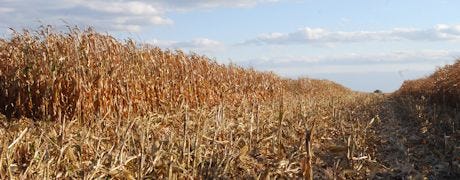
It's almost November 1 and it looks like the cool fall weather is here to stay. Prospects for corn drying down in the field aren't good. There's still a considerable amount of the 2013 Iowa corn crop out in the field waiting to be harvested.
Paul Kassel, Iowa State University Extension field agronomist in northwest Iowa, is hearing reports that the field dry-down of the corn grain crop is now around 20% moisture. "Prospects for a lot more field dry down are not real good," he says, "considering that this is the last week of October and the colder weather of late fall looks like it is here to stay."

PROSPECTS NOT GOOD: Prospects aren't good for letting corn that's still in the field stay there to try to get it to dry down more before harvesting it. The grain on the ears won't dry very fast now that colder weather is here in late fall. "It's risky to leave corn standing too long in the field," says ISU agronomist Paul Kassel. "Chances of yield loss due to corn lodging from wind or stalk rot or weak stalks are increasing."
He's put together some numbers---It takes about 30 Growing Degree Days (GDDs) for corn grain to dry one percentage point. And interestingly enough, 30 GDDs is the normal expected GDD accumulation for the last week of October at Spencer, Iowa. However, the weather forecast says the Spencer area may have below normal temperatures for the last week of October 2013. "Therefore, our grain moisture may not get a lot lower. We may need to spend the money to dry the crop," says Kassel.
It's risky to leave corn standing too long in the field once you get into late October and early November
The following are calculations – on a per acre basis – of corn-drying costs. This may help to justify the extra costs farmers will incur this year to get the corn crop harvested in a timely manner, says Kassel.~~~PAGE_BREAK_HERE~~~
The cost of drying a 180 bu. per acre corn crop is about $6 per acre per point of moisture for on-farm drying. This is figuring 0.02 gallon of LP per point of grain moisture and LP costs of $1.50 per gallon. This also figures an electric cost of 0.02kWh per bushel per point of moisture with electric costs of $0.15 KWh. This cost is energy only and does not include any fixed costs. Fixed costs would be the costs of the bins, driers, augers, etc. associated with on-farm drying systems.
The cost to commercially dry a 180 bu. per acre corn crop is about $6.40 per acre per point. This is based on $0.035 per bushel per point drying cost and 1.5% shrink. The actual moisture loss shrink is 1.18% per point of moisture, so there is some additional cost of the shrink factor if corn is harvested in the mid-20s for moisture content.
Cost to dry the corn in your on-farm dryer would be about $30 per acre—check fields now to get a reading on stalk strength and standability
Multiplying 5 points of moisture removed by $6 per acre cost for drying on the farm, it figures out to $30. Therefore, it is going to cost about $30 per acre to dry a 180 bu. per acre corn crop from 20% moisture to 15% moisture. "This is a cost – at least at this level – we have not incurred since 2008 and 2009," notes Kassel.
So, it is good advice to check each field for stalk quality and ear retention. Harvest on a timely basis if you can prevent a 3 to 4 bu. per acre pre-harvest loss versus gaining an extra point of dry down in the field.
ISU Extension offers update meetings for ag input providers
In other ISU Extension crop production news, updates on the latest crop production products and recommendations are featured topics at two Iowa State University Extension and Outreach meetings planned for December. The update meetings will be held Dec. 2 in Iowa City and Dec. 11 in Ames.
Agriculture input providers will have an opportunity to meet with extension specialists from Iowa State and hear presentations on Pythium seedling disease, Palmer amaranth management, cover crops, soybean aphids and changes to nutrient management recommendations. Each meeting also will feature presentations on weed, insect and crop disease management as well as soil, water and nutrient management.~~~PAGE_BREAK_HERE~~~
Update meetings will be hosted by ISU Extension and Outreach field agronomists.
Dec. 2 – Highlander Conference Center, 2525 N Dodge Street, Iowa City. Hosts: Jim Fawcett, [email protected] (319) 337-2145; Virgil Schmitt, [email protected] (563) 263-5701.
Dec. 11 – Quality Inn/Starlite, 2601 E. 13th Street, Ames. Hosts: Mark Johnson, [email protected] (515) 979-9578; Mark Licht, [email protected] (515) 382-6551.
For additional information, contact location hosts or visit the ISU Ag and Natural Resources Events page. Registration is $70 if received by midnight, Nov. 25 (Iowa City) or Dec. 5 (Ames). Registration after those dates is $85. Online registration and printable registration forms are available here.
Continuing Education: Both meetings are approved for Certified Crop Adviser (CCA) credits and recertification for Iowa Commercial Pesticide Applicators in categories 1A, 1B, 1C and 10. Recertification is included in meeting registration; attendance at the entire meeting is required for recertification.
About the Author(s)
You May Also Like




